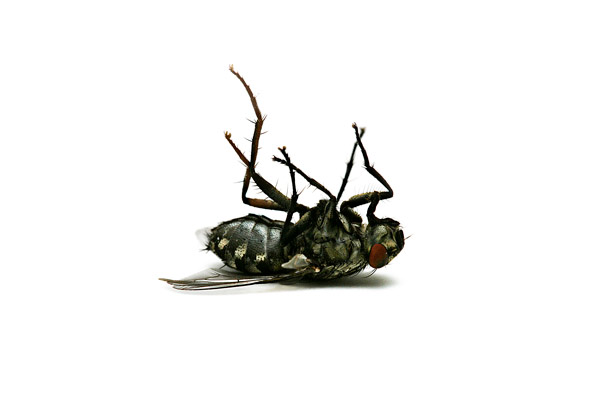Jul. 28, 2023 Research Highlight Biology
How a gut microbe causes flies to live fast and die young
The connection between a species of gut microbe in flies and an early death has been unraveled
RIKEN researchers have uncovered how one species of gut bacteria causes fruit flies to perish early1. This discovery illuminates the complex interactions between the microbes in our guts and our health.
The human gut is home to somewhere between 200 and 1,000 species of bacteria. The vast majority of these species are beneficial, converting food into useful compounds that the human body cannot make by itself. But some bacterial species have a negative impact on health.
The sheer number of bacterial species in the human gut makes it extremely challenging to untangle their individual effects on our health. Researchers find it much simpler to look at the gut microbiome of fruit flies since they only have about two to five bacterial species in their guts.
In a previous study, Fumiaki Obata of the RIKEN Center for Biosystems Dynamics Research had found that one of these species, Acetobacter persici, accelerated aging in flies, causing them to die early. “A. persici has a drastic impact on fly lifespan, curtailing it by about 20–30%,” says Obata. “But just how the gut microbe caused this big change in lifespan was unclear.”
Now, by feeding flies with a diet of dead A. persici, Obata and his co-workers have discovered the connection between A. persici and shortened fly lifespans.

RIKEN researchers have discovered how a species of gut microbe causes flies to die young. © Claus Christensen/Stone/Getty
To their surprise, the team found that the shortened lifespan is not due to a compound produced by A. persici. Rather, a component in the bacterium’s cell wall triggers a receptor in the fly’s gut, which stimulates the immune system, boosting the production of antimicrobial compounds and activating intestinal stem cells. It’s this enhanced immunity that causes the flies to die young.
In an intriguing twist, the team discovered that these effects also boost a fly’s resistance to infection by a harmful bacterium that can kill flies. It thus provides flies with a short-term advantage in exchange for an early death—a tradeoff that the researchers dubbed a ‘live fast, die young’ lifestyle.
“This increased resistance to infection explains why the vast majority of flies in the wild have A. persici or other Acetobacter species in their guts,” says Obata. “It’s better to have a strong resistance to stressors such as infection rather than to live to a ripe old age.”
The finding raises the possibility that ‘postbiotics’—food and drinks that contain dead gut microbes (rather than prebiotics containing live ones)—with health benefits could be developed.
The team aims to determine the genes involved in the immune signaling that leads to shorter lifespans. They also want to see if the same mechanism occurs in other animals such as mice and humans.

Fumiaki Obata (far right in back row) and his team have found that a gut microbe curtails the lifespan of fruit flies through triggering a receptor in the gut that recognizes a component of the bacterial cell wall. © 2023 RIKEN
Related contents
- ‘Non-essential’ building block proves vital to a healthy protein diet
- A gut microbe that can exacerbate obesity
- The distinct microbiome of centenarians may partially account for their longevity
Rate this article
Reference
- 1. Onuma, T., Yamauchi, T., Kosakamoto, H., Kadoguchi, H., Kuraishi, T., Murakami, T., Mori, H., Miura, M. & Obata, F. Recognition of commensal bacterial peptidoglycans defines Drosophila gut homeostasis and lifespan. PLoS Genetics 19, e1010709 (2023). doi: 10.1371/journal.pgen.1010709
